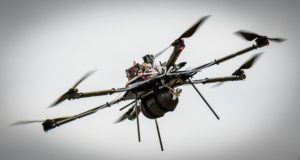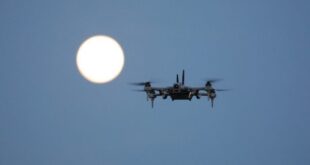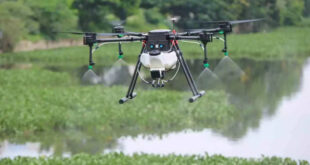What’s not to love about hydrogen? It’s the most abundant element in the universe; it’s the vital fuel that keeps the sun burning for a few trillion years; and it holds the number-one position on the periodic table.
And, as it turns out, hydrogen can also keep drones in the air for longer periods of time. In fact, there are at least 8 Reasons why Hydrogen Will Power the Drone Industry’s Future.
Case in point – carbon-fiber vessel designer HyPerComp Engineering is entering the drone game.
The Utah-based company recently announced a new partnership to provide compressed hydrogen fuel tanks for commercial drone company Ballard Unmanned Systems.
The FCair Composite Overwrap Pressure Vessel (COPV) line includes 3.5-liter, 4.7-liter, and 7-liter models. The vessels will enable flight times of one to six hours for various fixed wing and multi-rotor drones.
Li-Po batteries typically fuel most commercially available drones but are limited due to the fact that most only power, at best, a 30-minute flight. This means pilots must constantly change battery packs during a given deployment – an especially untenable situation for autonomous drones. For military-grade fixed-wing UAVs, diesel can be used but is harmful to the environment and difficult to store.
Clean-energy hydrogen fuel systems are carbon-free, renewable sources that may be a viable option for both rotor and winged drones going forward. Hydrogen fuel packs are produced by electrolysis to water, using energy from any source of energy including wind, solar, hydroelectric, or fossil sources.
“We look forward to the coming months and years as we broaden the FCair product line, and ramp from field trial to deployment volumes,” HyPerComp CEO Daryl Thompson said. “Our partnership with Ballard has benefited from both companies’ commitment to enabling the commercial hydrogen UAV market, and to assuring that the needed safety, performance, and interoperability standards are in place.”
In 2017, Ballard released a new hydrogen fuel-cell propulsion system which led to a contract with Boeing’s Insitu subsidiary to power test flights of the company’s ScanEagle drone platform.
Jason is a longstanding contributor to DroneLife with an avid interest in all things tech. He focuses on anti-drone technologies and the public safety sector; police, fire, and search and rescue.
Beginning his career as a journalist in 1996, Jason has since written and edited thousands of engaging news articles, blog posts, press releases and online content.
Email Jason
TWITTER:@JasonPReagan
Subscribe to DroneLife here.
https://dronelife.com/2019/05/18/tanks-for-the-assist-agreement-will-boost-drone-firms-hydrogen-cell-payload/
 Unmanned Aerial Vehicle The latest drone news
Unmanned Aerial Vehicle The latest drone news




